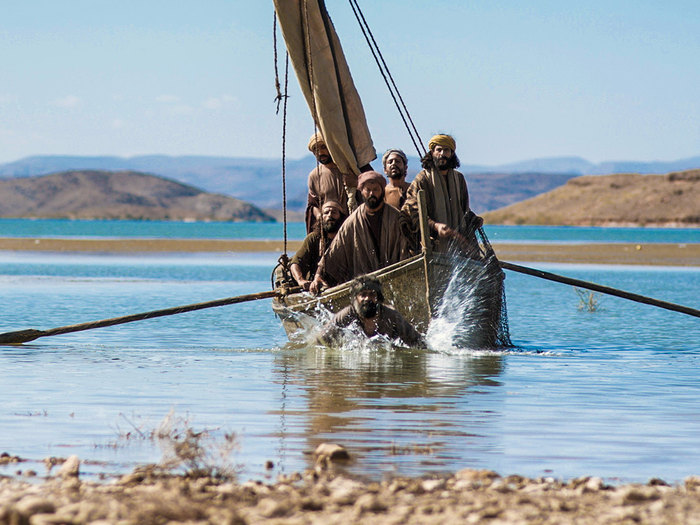Scripture readings: 2 Samuel 7:11-14a; Ps. 89:20-37; Eph. 2:11-22; Mark 6:30-34, 53-56 Sermon by Lance McKinnon from Mark 6:30-34, 53-56
Rest for All
Introduction
The apostles gathered around Jesus and reported to him all they had done and taught. Then, because so many people were coming and going that they did not even have a chance to eat, he said to them, “Come with me by yourselves to a quiet place and get some rest.” (Mark 6:30-31)
Mark begins today’s reading from the Gospels using the word “apostles” instead of his usual title of “disciples” when referring to the Twelve. The word apostle means “sent one.” Perhaps Mark wants us to read this story with an eye to the church.
What can we learn from Mark about being sent out in ministry and mission as representatives of the kingdom of God? First, we see that Jesus takes a keen interest in their activity—he listens to their experiences regarding what they are doing and teaching. He also is interested in their well-being—he notes that they are exhausted and needed rest.
When we find ourselves exhausted as “sent out” ones, we can know that Jesus is aware, actively bringing us to rest and wholeness. We can consider the possibility that what Jesus heard, regarding their doing and teaching, may have had something to do with their exhaustion. When our doing does not match our teaching, sooner or later, exhaustion and fatigue result.
What Jesus taught (his spoken theology) was never disconnected from what Jesus did (his working theology). Jesus “practiced what he preached,” and so should we. If the message we are sent to bring is the proclamation that Jesus is Savior of the world, as we do ministry we must trust him to be Savior, not ourselves.
Ministry and mission become a drain when our way of thinking places everything on our shoulders. Given the many demands that life throws at us as we participate in ministry with Jesus, we must not lose sight of who he is for us. It’s his ministry being done in the Spirit, not ours. Understanding this “teaching” can safeguard us from being worn out by our “doing.”
Whether this contributed to the exhaustion of the apostles or not does not change the fact that they needed wholeness and restoration in all their doing and being. Jesus takes them by boat to a place where they can be restored:
So they went away by themselves in a boat to a solitary place. (Mark 6:32)

We can imagine that as they journeyed, they knew the end destination. Maybe they were singing hymns or just relaxing and enjoying each other’s company. The trip in the boat, which traveled close to shore, drew the attention of many onlookers who also needed healing and wholeness. The crowd “recognized them” and ran to intersect them:
But many who saw them leaving recognized them and ran on foot from all the towns and got there ahead of them. When Jesus landed and saw a large crowd, he had compassion on them, because they were like sheep without a shepherd. So he began teaching them many things. (Mark 6:33-34)
As the church worships and fellowships together with Jesus, knowing where he’s taking us, we will draw the attention of other weary travelers looking for rest. Our witness to the world becomes quite powerful when our teaching of faith, hope and love is matched by a fellowship that lives out that reality. Pointing to Jesus for rest is more effective when we are not yawning. It’s hard to convince people that Jesus is a source of rest when we ourselves are still struggling!
Now comes a catch in the story. Jesus is taking them to a place of rest and restoration. Before they arrive, they are met with a crowd of hurried and frantic people. Jesus is moved with “compassion for them, because they were like sheep without a shepherd; and he began to teach them many things.” So much for the needed rest the apostles were hoping for!
“Compassion” is what drives Jesus to continue his ministry of teaching and doing. It’s the Father’s love for all his children that energizes Jesus’ ministry and mission.
At the end of the story, Jesus and the apostles “got out of the boat” and this time the people “recognized him.” That’s the goal of ministry and mission. We are not trying to get onlookers to recognize us but rather to recognize the source of compassion and rest that we have found in Jesus.
The story doesn’t end with the apostles getting rest by themselves. It ends with people in all sorts of conditions, coming from all kinds of places, finding healing and wholeness in the Lord:
When they had crossed over, they landed at Gennesaret and anchored there. As soon as they got out of the boat, people recognized Jesus. They ran throughout that whole region and carried the sick on mats to wherever they heard he was. And wherever he went—into villages, towns or countryside—they placed the sick in the marketplaces. They begged him to let them touch even the edge of his cloak, and all who touched it were healed. (Mark 6:53-56)
True rest is found when the wholeness and healing Jesus brings is extended out to others. We are all connected as children of God and therefore our rest and wholeness comes to its fullness when experienced by others. May we faithfully participate in Jesus’ ministry and mission, fueled with his compassion, anchored in hope of where he is taking us.



Please note that comments are moderated. Your comment will not appear until it is reviewed.